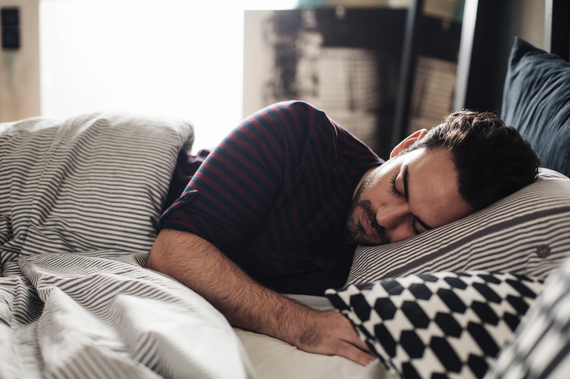By Maya Borgueta, Psy.D and Senior Coach at Lantern
For anyone who has ever spent a long night wide awake with worry, it may come as no surprise that anxiety and long nights of sleeplessness often make familiar-and unfortunate-bedfellows. The anxious thoughts that keep you up at night can run the gamut from day-to-day concerns to big life-and-death questions and everything inbetween. Studies show as many as 90 percent of individuals currently suffering an anxiety disorder also struggle with clinically significant insomnia. Most people have trouble sleeping once in a while, and about 70 million Americans have ongoing bouts of difficulty sleeping, leading the Centers for Disease Control and Prevention (CDC) to declare insufficient sleep a public health epidemic.
If you're dealing with both anxiety and sleeping problems, managing your anxiety is the best place to focus to get relief. Don't reach for the sleeping pills either-research shows Cognitive Behavioral Therapy (CBT) is the most effective way to address sleeplessness and the anxiety that may be causing it.
The connection between sleeplessness and anxiety
Anxiety is a natural, adaptive human response to a perceived threat, and its job is to prepare us to respond to danger. Unfortunately, our bodies don't do a great job of distinguishing physical danger-"Wild dogs are attacking-RUN!"-from psychological threats like "I'm going to make a fool of myself at work tomorrow." Both types of threats trigger the same boost of stress hormones like adrenaline and cortisol, which can throw you into a constant state of stress. When we're anxious at night in bed, our bodies get stuck in a state of fight-or-flight, at exactly the moment we'd most like to relax.
Research suggests that link between anxiety and insomnia can go the opposite direction as well. Individuals suffering from insomnia with no previous history of anxiety are more likely to develop an anxiety disorder down the road than their well-rested counterparts, and treating sleep problems can improve anxiety and mental health overall.
When anxiety is preventing a good night's sleep, there are two general strategies that are most helpful: improving your ability to relax your body, and challenging the anxious thoughts that are keeping you awake.
Relaxing the body is actually faster and easier to do than many people realize. The simplest methods for inducing relaxation involve learning to slow down and control breathing. There are a variety of techniques that do this, but the idea is the same: slow down the breath and the body and mind follow.
Here's how to practice the 4-7-8 technique:
- Inhale deeply through your nose to a count of four
- Hold your breath for a count of seven
- Exhale slowly through your mouth to a count of eight
- Repeat through several cycles and notice how different you feel before and after
The 4-7-8 technique is extremely helpful before bed, and because it involves nothing but you and your lungs, you can also try it anytime you need to take your stress and tension down a notch or two. With this exercise-as with all relaxation techniques-it gets easier with practice.
If relaxation alone is not enough to lull you to sleep, it may also be worth taking a look at the anxious thoughts and worries that are contributing to insomnia. Worries are adaptive responses that are meant to be helpful-they alert us to potential dangers and make sure we pay attention. However, when someone is on the go all day, perhaps avoiding worries or simply too busy to notice them, worries often show up full-force during the one quiet time of the day: bedtime.
Creating a worry time can leave you with a clear mind at night
Setting aside a specific, designated "worry time" to focus on those thoughts may sound illogical, but research shows that this actually frees people to be less worried during the rest of the day, including at bedtime. Try planning a single, 30-minute worry period during the day and see how this impacts your anxiety at bedtime.
Sleep may be seen as a luxury in our fast-paced society, but as far as emotional and physical health is concerned, it's a necessity. Fortunately, learning some basic techniques for countering the anxiety that leads to insomnia can make a huge difference. Remember, these techniques take some practice, so be patient and experiment with what works for you. Sweet dreams.
-- Maya Borgueta, Psy.D and Senior Coach at Lantern
This article first appeared on Lantern's blog, which shares expert advice and research on strengthening emotional well-being.
Also on HuffPost:

